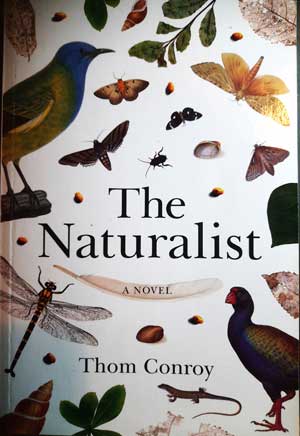Reading (and ‘misreading’) New Zealand!
View(s):For a moment, it seemed that the sailor was mistaken…but then he saw it: a green knob of a mountain breaking the line of cloud: the southern island of New Zealand. (The Naturalist, Thom Conroy)
Charles Darwin’s son, Francis, writing about his famed father surmises that “one of the greatest services rendered by my father to the study of Natural History is the revival of Teleology. The evolutionist studies the purpose or the meaning of organs with the zeal of the older Teleologist, but with far wider and more coherent purpose. He has the invigorating knowledge that he is gaining not isolated conceptions of the economy of the present, but a coherent view of both past and present.”
 One of the anxieties—or neurosis!—of reading Thom Conroy’s historical novel, The Naturalist, which is woven around
One of the anxieties—or neurosis!—of reading Thom Conroy’s historical novel, The Naturalist, which is woven around
the life and times of the naturalist and the first trained scientist to live in the newly discovered New Zealand in the early nineteenth century, Dr. Ernest Dieffenbach, is the eerie and ‘living’ presence of Teleology within the text.
As Eagleton would articulate, Conroy’s textual tapestry contains ‘potentials of the present’ which would inevitably flow into ‘a specific future.’ It is this flowing ‘neurosis’ that powers Conroy’s novel drawing the reader into a Pinterian Absurd drama whose ‘meaning’ is to be extracted from the ‘meaningless.’
Make no mistake about this: here is a novel about a nation, its discovery (or ‘recovery’—as the anti-hero Jerningham might utter), its reading (or ‘misreading’), its taming (or ‘subjugation’) and its writing (or ‘plotting’). Like any work of art thematizing a nation it is schizophrenic—it releases many a ‘voice,’ folkloric, romantic, industrialist, or sensualist. It is replete with historical maps, rich illustrations, a network of support notes and a list of characters—thus blurring the boundaries between fiction and non-fiction: if there are such boundaries that is.
Naturally, a novel of such magnitude demands a beginning such as the one granted by Brahms to his Symphony No 1: a spontaneously drawn-out pulsation that rises to the universe illuminating the etheric space. Perhaps not! Conroy has other ideas, as he offers Dicken’s A Tale of Two Cities a good run for its money.
“Ernst had been here before…here, on the outside peering in…”
Haven’t we all been ‘here’ before, haven’t we known it all? And haven’t we all been outsiders (i.e.. readers!) as we turn the pages and begin to absorb the agitation of a novel? Conroy, like his main protagonist, Ernst, is “restless…and lucid” as he abandons the reader into her own devices from the beginning of his novel. We readers are thus invited to ‘read’ (or ‘misread’) New Zealand as we encounter the geography, sociography and psychography of the land and its natives and non-natives. Ernst, the sensitive and empathetic naturalist, and the main protagonist, is already an ‘outsider’ to the harsher reality he is forced to live with and navigate.
His idealism, Romanticism, liberalism, and equality—some of these qualities were a direct outcome of his scientific inquiry, a position that undeniably invites comparison with Darwin, who appears in the novel—find themselves almost ‘unread’ in a world where such values are only preserved in a transparent box as specimens of Entomology.
Ernst is forced to balance his proclivity for adventure against a deep desire to be loved, cared for and domesticated. At the same time, the notion of ‘home’ haunts him as he lives in exile from the geography that draws his heart like a magnet, Giessen. As Ernst is drawn into the potentialities of immortality via discovery in New Zealand, he must decide between his irresistible and endearing romantic alliances with Nora, whose solid and comforting presence in London makes the sombre, at times unforgiving, city vibrant and colourful.
As Ernst pines for Giessen, the home of his heart, he must learn to absorb the fossilized intricacies of bureaucracy and officialdom there. Thrown into this restless reality are a cast of characters from colonial fortune seekers to native interpreters to publishers to revolutionaries making Conroy’s novel an impossible treat to put down.
One must remember to read this novel in one go—the rewinding and fast forwarding of time and various locations demand serious attention. At the same time, the indigestible violence one would expect to find in ‘land-buying’ ventures of colonialists is moderated in the novel and might disrupt the sensibilities of ‘reality-addict’ readers. Darwin, you could say should appear more often in the novel, his frequent ‘absence’ creates a veritable vacuum that draws in our (wicked) thoughts like a black hole in deep space.
The Naturalist is a novel whose motivations are seemingly driven by a desire to establish the human being into a common centre with differences attributed to circumstances. At the same time, the novel attempts to navigate the inevitable notion that such progressiveness of thought is rare among humankind. The ‘neurosis’ of the novel is born out of this contention. Ignorance is kind to the heart and mind. And as the novel progresses into its wildest peripheries of human existence one cannot help but see the loaded irony in Conroy’s beginning, “Ernst had been here before…” and one cannot resist but remember Eliot’s verse:
We have lingered in the chambers of the sea By sea-girls wreathed with seaweed red and brown Till human voices wake us, and we drown.
| Book facts | |
| The Naturalist by Thom Conroy Reviewed by Lal Medawattegedara |
Searching for an ideal partner? Find your soul mate on Hitad.lk, Sri Lanka's favourite marriage proposals page. With Hitad.lk matrimonial advertisements you have access to thousands of ads from potential suitors who are looking for someone just like you.


